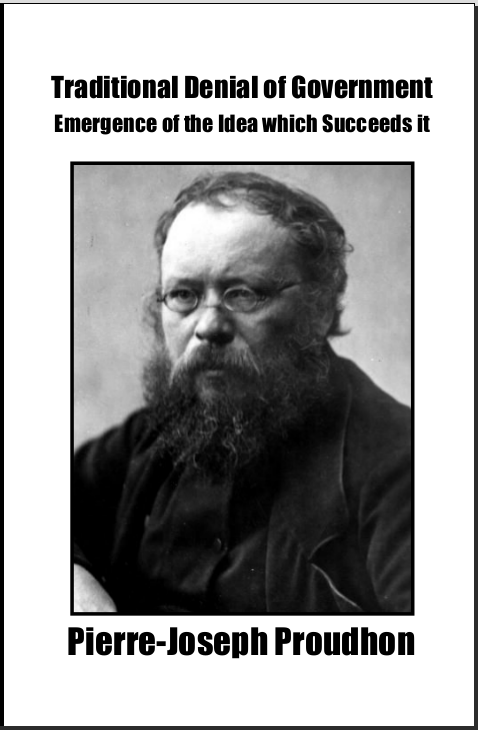C4SS has teamed up with the Distro of the Libertarian Left. The Distro produces and distribute zines and booklets on anarchism, market anarchist theory, counter-economics, and other movements for liberation. For every copy of Pierre-Joseph Proudhon’s “Traditional Denial of Government” that you purchase through the Distro, C4SS will receive a percentage. Support C4SS with Pierre-Joseph Proudhon’s “Traditional Denial of Government“.
$2.00 for the first copy. $1.00 for every additional copy.
The classic analysis of the contradictions of statism, the ideal of authority, and the attempt to establish social order by imposing social control, by Pierre-Joseph Proudhon, the 19th century French radical who became the first political thinker to describe himself as an Anarchist. From Proudhon’s 1851 masterpiece, General Idea of the Revolution in the Nineteenth Century.
The form under which men first conceived of Order in Society is the patriarchal or hierarchical; that is to say, in principle, Authority; in action, Government. Justice, which afterwards was divided into distributive and commutative justice, appeared at first under the former heading only: a SUPERIOR granting to Inferiors what is coming to each one. . . .
. . . What really is the Social Contract? An agreement of the citizen with the government? No, that would mean but the continuation of the same idea. The social contract is an agreement of man with man; an agreement from which must result what we call society. In this, the notion of commutative justice, first brought forward by the primitive fact of exchange, and defined by the Roman law, is substituted for that of distributive justice, dismissed without appeal by republican criticism. Translate these words, contract, commutative justice, which are the language of the law, into the language of business, and you have Commerce, that is to say, in its highest significance, the act by which man and man declare themselves essentially producers, and abdicate all pretension to govern each other.
Commutative justice, the reign of contract, the industrial or economic system, such are the different synonyms for the idea which by its accession must do away with the old systems of distributive justice, the reign of law, or in more concrete terms, feudal, governmental, or military rule. The future hope of humanity lies in this substitution. . . .
Thus, while the revolutionary tradition of the sixteenth century gave us the idea of the Social Contract as an antithesis to that of Government . . . this great and decisive negation remained not understood, all through the eighteenth century. But an idea cannot perish. It is born again, always from its contradictory. . . .
The sovereignty of Reason having been substituted for that of Revelation,
The notion of Contract succeeding that of Government,
Historic evolution leading Humanity inevitably to a new system,
Economic criticism having shown that political institutions must be lost in industrial organization,
We may conclude without fear that the revolutionary formula cannot be Direct Legislation, nor Direct Government, nor Simplified Government, that it is NO GOVERNMENT.
Neither monarchy, nor aristocracy, nor even democracy itself, in so far as it may imply any government at all, even though acting in the name of the people, and calling itself the people. No authority, no government, not even popular, that is the Revolution.








